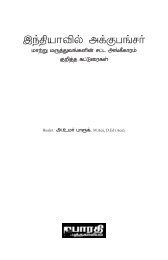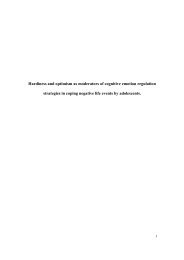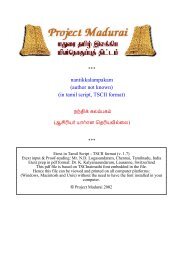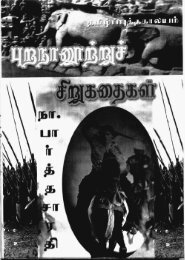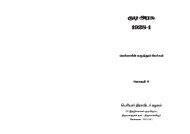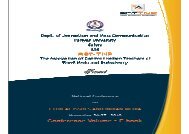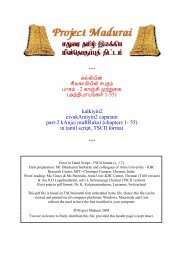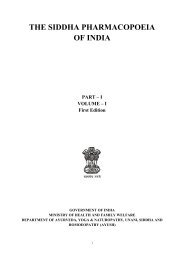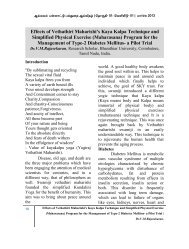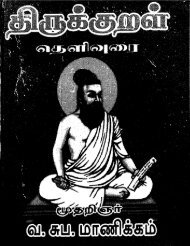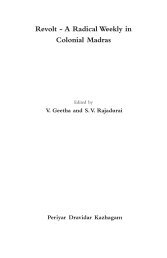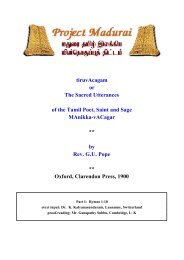THE FUNDAMENTAL RULES OF THE TAMIL NADU GOVERNMENT
THE FUNDAMENTAL RULES OF THE TAMIL NADU GOVERNMENT
THE FUNDAMENTAL RULES OF THE TAMIL NADU GOVERNMENT
- No tags were found...
You also want an ePaper? Increase the reach of your titles
YUMPU automatically turns print PDFs into web optimized ePapers that Google loves.
the posts. In such cases, the ‘personal pay’ is admissible to permanent incumbents, if any, as well asto officiating incumbents.In the case of officiating Government servants or Government servants appointed substantively toa cadre and not to individual posts in the cadre, it has been decided that for purpose of eligibility todraw the personal pay, the continuity of tenure of a Government servant in the post should beconsidered unbroken if (1) he takes leave on average pay not exceeding four months and returns tothe same post on the expiry of his leave or (2) he is deputed temporarily on other duty foradministrative reasons or (3) officiates in a higher post and returns to the same post on the expiry ofsuch duty, provided that it is certified, by Government in the case of Group A and B Officers and bythe Head of the Department in the case of Group C and D Officers, that the incumbent would havecontinued to hold the appointment in respect of which the “personal pay” was granted but for such deputation orpromotion as the case might be.Note.—(1) The term “same post” in the above rule should be interpreted to cover posts of thesame category in a cadre and not necessarily the posts at the same station.(G.O. Ms. No. 822, Finance, dated 30th December 1933).Note.—(2) For purposes of the orders embodied in the second sub-paragraph, persons in receiptof the same scale of pay in the Tamil Nadu Ministerial Service should be treated as belonging to aparticular cadre. For example, all lower division clerks, on Rs. 90 — 140 should be treated asbelonging to one cadre while upper division clerks on Rs. 125—175 should be treated as belonging toanother cadre.(Finance Memorandum No. 22016-C.S.R. 3, dated 30th October 1935.)3. The protection afforded by Rule 23 applies only to special pays attached to posts. “Unhealthylocalities special pays” are not attached to posts but are fixed with reference to localities. They arenot admissible to all persons holding the posts (which would be the case if the special pays wereattached to the posts) as persons who are natives of or are domiciled in the locality are not eligible forthem.(Finance Memorandum No. 28576, C.S.R., dated 27th October 1933.)4. The Agricultural Engineering Supervisors with three years service and who have passedSections ‘A’ and ‘B’ of the A.M.I.E. shall be treated as Junior Engineers and that they shall be giventhe scale of pay applicable to Junior Engineers.[G.O. Ms. No. 383, Personnel and Administrative Reforms (F.R.I.), dated 23rd March 1979 - witheffect from 8th October 1974.]24. An increment shall ordinarily be drawn as a matter of course unless it is withheld. Anincrement may be withheld from a Government servant by Government or by any authority towhom Government may delegate this power under Rule 6, if his conduct has not been good orhis work has not been satisfactory. In ordering the withholding of an increment, thewithholding authority shall state the period for which it is withheld and whether thepostponement shall have the effect of postponing future increments.Note 1.—The authority competent to withhold increments from Government servant is the authorityin which such power has been vested under rule 14 of the Tamil Nadu Civil Services (Discipline andAppeal) Rules.Note 2.—The procedure that should be followed for stoppage of increment of a Governmentservant under the rule-making control of the Government of Tamil Nadu is the procedure prescribed inRule 17 (a) of the Tamil Nadu Civil Services (Discipline and Appeal) Rules or rule 3 (a) of the TamilNadu Police Subordinate Services (Discipline and Appeal) Rules, 1950, as the case may be.Instruction under Rule 24.An authority withholding an increment of an officer should expressly state in the order that theperiod for which the increment has been stopped will be exclusive of any interval spent on leavebefore the period is completed.If a Government servant avails leave during the period of punishment, the period of punishmentshall be extended. If during such extended period, he again goes on leave, the increment shall bepostponed further corresponding to the period of leave availed of by him, during the extended periodof punishment.[G.O. Ms. No. 591, Personnel and Administrative Reforms (F.R.II) Department, dated 22nd June1982.]41



